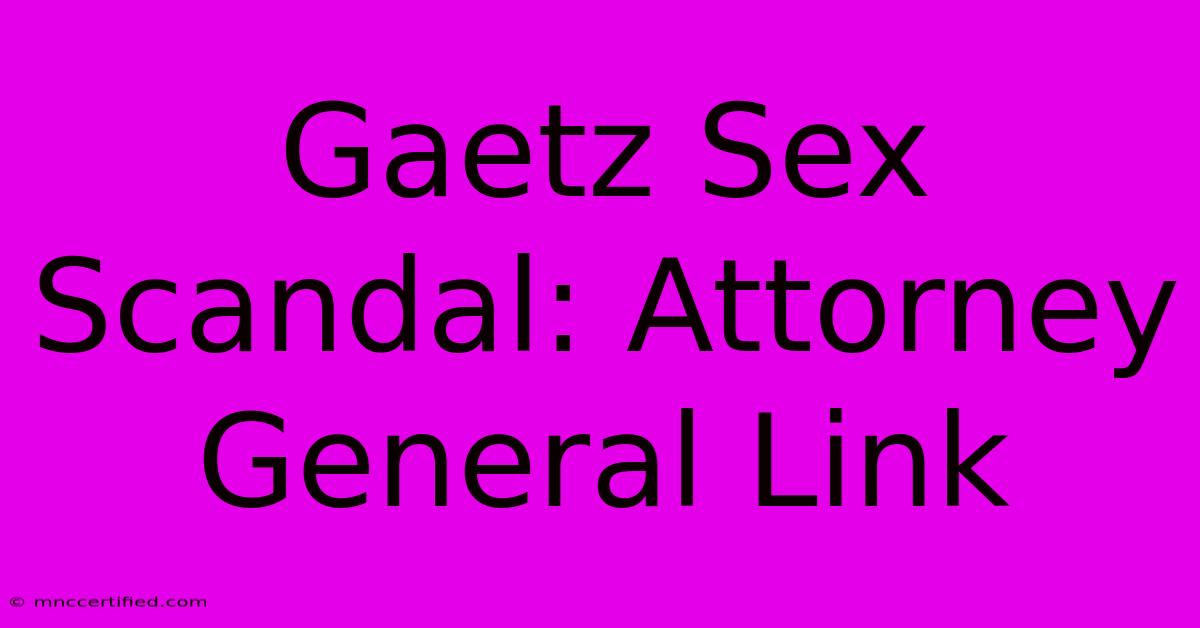Gaetz Sex Scandal: Attorney General Link

Table of Contents
Gaetz Sex Scandal: Unraveling the Allegations and Attorney General Connections
The allegations surrounding Congressman Matt Gaetz have sparked intense public scrutiny and fueled numerous conspiracy theories. While the core of the scandal centers on accusations of sex trafficking and illicit relationships with underage girls, the potential involvement or knowledge of high-ranking officials, including those within the Department of Justice, has significantly escalated the controversy. This article delves into the complexities of the Gaetz sex scandal, examining the key allegations and exploring the links—or lack thereof—to the Attorney General.
The Core Allegations Against Matt Gaetz
The initial allegations against Congressman Gaetz involved his relationships with several young women, some of whom were allegedly underage. These accusations, first reported by the New York Times, triggered a Department of Justice investigation. The investigation focuses on whether Gaetz violated federal sex trafficking laws by engaging in or facilitating sex acts with a minor in exchange for money or something of value. Crucially, these are allegations, and Gaetz has consistently denied any wrongdoing.
The investigation is complex, involving multiple individuals and potentially spanning several years. Key aspects of the investigation include:
- The role of Joel Greenberg: Greenberg, a former Seminole County tax collector and close associate of Gaetz, pleaded guilty to sex trafficking and other charges. His cooperation with federal investigators has been pivotal in the ongoing probe.
- Financial transactions: Investigators are examining financial records to determine whether Gaetz provided money or other benefits to the women involved.
- Witness testimonies: The credibility and reliability of witness statements will be crucial in determining the outcome of the investigation.
The Attorney General Connection: Fact vs. Fiction
Speculation regarding the Attorney General's involvement or knowledge of the Gaetz investigation has run rampant. It's important to separate credible information from unsubstantiated claims.
Currently, there is no publicly available evidence suggesting direct involvement or complicity of the Attorney General in any alleged cover-up or obstruction of justice related to the Gaetz investigation. While the Attorney General's office oversees the Department of Justice, which is conducting the investigation, it's standard procedure for such investigations to operate with a degree of independence.
Claims of a cover-up often rely on circumstantial evidence, perceived delays in the investigation, or interpretations of political maneuvering. However, these claims lack concrete proof and should be viewed with skepticism until further evidence is presented.
Navigating the Information Landscape
The Gaetz scandal has been a breeding ground for misinformation and biased reporting. It is essential to critically evaluate information sources and avoid spreading unverified claims. Relying on reputable news outlets with a proven track record of journalistic integrity is crucial in understanding the complexities of this ongoing investigation.
To form an informed opinion:
- Consult multiple sources: Compare information from various news organizations and fact-checking websites.
- Verify information: Cross-reference facts and figures from different sources to ensure accuracy.
- Be wary of biased reporting: Recognize potential biases in reporting and consider alternative perspectives.
- Avoid spreading unverified information: Refrain from sharing information that hasn't been independently verified by credible sources.
Conclusion: Awaiting Resolution
The Gaetz sex scandal remains under investigation, and the potential links to the Attorney General continue to be debated. While speculation is rampant, it's crucial to rely on verifiable facts and credible reporting. The ongoing investigation will ultimately determine the truth of the allegations and whether any individuals, beyond Congressman Gaetz, will face legal consequences. Until then, responsible media consumption and critical evaluation of information are paramount.

Thank you for visiting our website wich cover about Gaetz Sex Scandal: Attorney General Link. We hope the information provided has been useful to you. Feel free to contact us if you have any questions or need further assistance. See you next time and dont miss to bookmark.
Featured Posts
-
Spurs Turnover Troubles Continue
Dec 24, 2024
-
Is Nolans Next Film The Odyssey
Dec 24, 2024
-
Red Sox Land Buehler Deal
Dec 24, 2024
-
Trump News Nationalizing Key Assets
Dec 24, 2024
-
Canton Officials Address Honda Nissan Deal
Dec 24, 2024